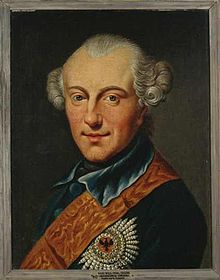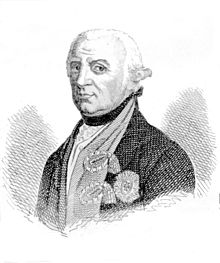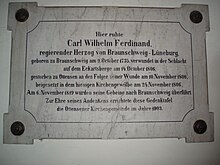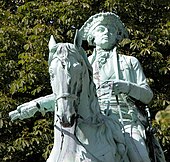Karl Wilhelm Ferdinand (Braunschweig-Wolfenbüttel)
Karl Wilhelm Ferdinand von Braunschweig-Wolfenbüttel (born October 9, 1735 in Wolfenbüttel , † November 10, 1806 in Ottensen near Hamburg from injuries from the battle of Jena and Auerstedt) was a German prince , inherited Duke of Braunschweig and Lüneburg and from 26. March 1780 sovereign in the Principality of Braunschweig-Wolfenbüttel .
Karl Wilhelm Ferdinand was in the Prussian service as field marshal . In the First Coalition War he held the supreme command of the Allied army from 1792 to 1794. He was remembered above all through the Duke of Braunschweig's manifesto of July 25, 1792, which was intended to intimidate the revolutionary French, but achieved the opposite and triggered the Tuileries storm . At the head of the Prussian army he suffered a serious wound on October 14, 1806 in the battle of Auerstedt , to which he succumbed a little later.
As the son and successor of Karl I (1713–1780), Karl Wilhelm Ferdinand is incorrectly listed in some later sources as Karl II or Karl II Wilhelm Ferdinand . In this case, he should not be confused with his grandson, Duke Karl II of Braunschweig (1804–1873), the regent of the Duchy of Braunschweig , the successor state of the Principality of Braunschweig-Wolfenbüttel.
Life
Karl Wilhelm Ferdinand was the son of Duke Karl I of Braunschweig-Wolfenbüttel and Philippine Charlotte of Prussia , a sister of King Friedrich II of Prussia . Growing up among his 13 siblings, as the Hereditary Prince of the Principality , he received an appropriate education from the theologian Johann Friedrich Wilhelm Jerusalem .
Due to the close family ties to the Prussian royal house and a subsidy agreement in which the Principality of Braunschweig-Wolfenbüttel made troops available to Prussia, the young Karl Wilhelm Ferdinand fought on the Allied side against France during the Seven Years' War in the battles of Hastenbeck , Minden and Warburg . There was even a violent conflict between him and his father, which asked him to leave the army. His uncles Ludwig and Ferdinand showered him with encouragement to the contrary. The unfortunate Hereditary Prince was finally released from his dilemma by King Friedrich, who led Duke Karl back to the North German coalition with gentle force.
On January 16, 1764, Karl Wilhelm Ferdinand married the eldest sister of King George III. of Great Britain, Princess Augusta of Hanover . The relationship between the spouses was conventional and adhered to courtly forms. The marriages of the daughters Auguste Caroline and Caroline Amalie failed, and of his four sons only the youngest, Friedrich Wilhelm , was physically and mentally healthy enough to succeed his father in 1806. On a trip to Italy in 1766, Duke Karl Wilhelm Ferdinand met his long-time mistress Maria Antonia von Branconi († July 7, 1793). From this relationship a son arose, Karl Anton Ferdinand Graf von Forstenburg .
In 1777 he separated from Maria Antonia von Branconi and replaced her with Luise von Hertefeld. He lived happily with this mistress for almost 30 years (and separated from his own wife). Luise von Hertefeld described his daughter Karoline as “the most beautiful and ingenious creature at court”.
In 1780, Karl Wilhelm Ferdinand succeeded his father as Prince of Braunschweig-Wolfenbüttel. His government was at first skilfully run. Successful reforms allowed the small principality of Braunschweig to flourish. Under the influence of Abbot Jerusalem and the pedagogue Joachim Heinrich Campe , the Duke was a real enlightened prince who also promoted art, e.g. B. the singer Karl Melchior Jakob Moltke . Also Gotthold Ephraim Lessing , librarian at Wolfenbüttel Herzog August Bibliothek , Charles William Ferdinand helped in winter 1780/1781, as conservative imperial estates against him censorship because of the fragments dispute wanted to take.
But his greatest passion remained the military. In 1773 he took over the former regiment " Schwerin on foot " in Halberstadt . In 1787 Karl Wilhelm Ferdinand was appointed Prussian field marshal . In the summer of 1787 he moved with an army to Wesel , and in September he occupied Holland when the governor Wilhelm V and his wife Wilhelmina got into trouble and a civil war had threatened for a year. His adversaries, the Patriots , fled to Amsterdam , and the city surrendered on October 10th. Probably for this reason the Brandenburg Gate was built in Berlin afterwards , this on behalf of King Friedrich Wilhelm II , who came to the aid of his sister with an army of 26,000 men.
During the First Coalition War he was given supreme command of the Prussian and Austrian troops that were supposed to defeat the French Revolutionary Army. With the ineptly formulated manifesto of the Duke of Braunschweig of July 25, 1792, which announced the bombing of Paris should the royal family be injured, he provoked the Tuileries storm and thus contributed to the end of the monarchy in France . The project failed with the cannonade of Valmy . He was victorious in the battle of Kaiserslautern in 1793 . The Duke resigned the supreme command in 1794.
In 1796 he led the observation corps on the Weser , which on the Prussian side was supposed to secure the demarcation line established in the Peace of Basel . During the third coalition war , Braunschweig was given supreme command in October 1805 over the troops that had been concentrated in Prussia and Silesia . From January to March 1806 King Friedrich Wilhelm III sent him . on a diplomatic mission to the St. Petersburg court in order to restore the understanding with Russia, which had been clouded by the Treaty of Schönbrunn .
In the course of the fourth coalition war, Friedrich Wilhelm III. in the summer of 1806 Karl Wilhelm Ferdinand with the supreme command of the Prussian main army. For him and in public he was considered by hymnal praise of Frederick the Great as the greatest Prussian general of the late 18th century; others complained about his indecision, which increased with age. Karl Wilhelm Ferdinand himself had initially resisted because the death of Luise von Hertefeld had suffered a severe blow of fate.
At the beginning of the battle of Auerstedt on October 14, 1806, a rifle bullet coming from the side smashed both eyes. The loss of the commander-in-chief contributed significantly to the Prussian defeat. On October 20th, Karl Wilhelm Ferdinand reached Braunschweig on a stretcher. By renouncing the elderly sons who were visually impaired, he appointed the youngest Friedrich Wilhelm von Oels as heir to the throne. In a message to Napoleon , he asked for his neutral country to be spared and for himself to let him die in peace. Since Napoleon refused, he left Braunschweig again on October 25th and reached - via Celle and Harburg - Altona and thus neutral Danish territory. He took quarters at the Am Felde 5 inn in Ottensen . He was privileged to bid farewell to his wife, sister and two eldest sons there before he succumbed to his wounding on November 10, 1806 at the age of 71. Initially buried in the Christian church in Ottensen, he found his final resting place in 1819 in the crypt of the Brunswick Cathedral .
progeny
Karl Wilhelm Ferdinand married Princess Augusta of Hanover (1737-1813) in 1764 , daughter of Friedrich Ludwig von Hanover , prince of Wales .
- Auguste Karoline Friederike Luise (1764–1788) ⚭ 1780 Friedrich II. , Duke of Württemberg
- Karl Georg August (1766–1806) ⚭ 1790 Friederika Louise Wilhelmina of Orange (1770–1819)
- Caroline Amalie (1768–1821) ⚭ 1795 George IV , King of Great Britain
- Georg (1769-1811)
- August (1770–1822)
- Friedrich Wilhelm (1771-1815)
- Amelie Karoline Dorothea Luise (1772–1773)
Karl Anton Ferdinand (1767–1794), knighted as Count von Forstenburg in 1773, came from an extramarital relationship with Maria Antonia von Branconi that had existed since 1766 . He had another son, the educator Johann Jakob Theodor Schacht (1786–1870), with Elisabeth Philippine Hagemann (1746–1809).
Statues and monuments
- Equestrian statue in front of Braunschweig Castle , unveiled on November 10, 1874, designed by Franz Pönninger and executed by Georg Ferdinand Howaldt
- Hassenhausen bei Bad Kösen ( Burgenlandkreis / Sachsen-Anhalt ): Memorial at the site of the wounding during the battle of Auerstädt on October 14, 1806, erected in April 1808 in the Taugwitz cemetery , moved in 1815 to the roads between Taugwitz and Hassenhausen.
- On the Löwenwall in Braunschweig, the obelisk on the Löwenwall commemorates him and his son Friedrich Wilhelm
literature
- Joseph König : Karl Wilhelm Ferdinand. In: New German Biography (NDB). Volume 11, Duncker & Humblot, Berlin 1977, ISBN 3-428-00192-3 , p. 224 f. ( Digitized version ).
- Kurt von Priesdorff : Soldier leadership . Volume 2, Hanseatische Verlagsanstalt Hamburg, undated [Hamburg], undated [1937], DNB 367632772 , pp. 82-88, no. 610.
- Gerhard Schildt : Braunschweig-Lüneburg, Karl Wilhelm Ferdinand Duke of. In: Horst-Rüdiger Jarck , Günter Scheel (ed.): Braunschweigisches Biographisches Lexikon - 19th and 20th centuries . Hahnsche Buchhandlung, Hannover 1996, ISBN 3-7752-5838-8 , p. 93 .
- Selma Stern : Karl Wilhelm Ferdinand Duke of Braunschweig and Lüneburg (= publications of the Historical Commission for Hanover, Oldenburg, Braunschweig, Schaumburg-Lippe and Bremen. Volume 6). Hildesheim / Leipzig 1921.
- Paul Zimmermann : Abbot of Jerusalem reports on the upbringing of the children of Duke Charles I, especially the Hereditary Prince Karl Wilhelm Ferdinand. In: Yearbook of the history association for the Duchy of Braunschweig. 5, 1906, pp. 129-164.
- Paul Zimmermann : Karl Wilhelm Ferdinand, Duke of Braunschweig and Lüneburg . In: Allgemeine Deutsche Biographie (ADB). Volume 15, Duncker & Humblot, Leipzig 1882, pp. 272-280.
- Friedrich Wilhelm von Kleist : Diary of the Prussian campaign in Holland. 1787. Digitized
Web links
- Literature by and about Karl Wilhelm Ferdinand in the catalog of the German National Library
- Detailed curriculum vitae in NapoleonWiki
Individual evidence
- ↑ The title of duke was carried out by all of the principal principalities of Braunschweig-Lüneburg.
- ^ Thea Leitner : Scandal at court. Ueberreuter, 1993, ISBN 3-8000-3492-1 .
- ↑ Hannes Kerber: "The Enlightenment in front of the court. On the historical background of GE Lessings 'Comments on an expert opinion on the itzigen religious movements' (1780)", in: Germanisch-Romanische Monatsschrift 68: 1 (2018), pp. 27-71, v. a. Pp. 51-55.
| predecessor | Office | successor |
|---|---|---|
| Charles I. |
Prince of Braunschweig-Wolfenbüttel 1773–1806 |
French occupation |
| personal data | |
|---|---|
| SURNAME | Karl Wilhelm Ferdinand |
| BRIEF DESCRIPTION | Prussian field marshal |
| DATE OF BIRTH | October 9, 1735 |
| PLACE OF BIRTH | Wolfenbüttel |
| DATE OF DEATH | November 10, 1806 |
| Place of death | Ottensen near Hamburg |





